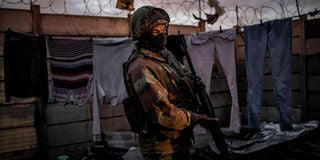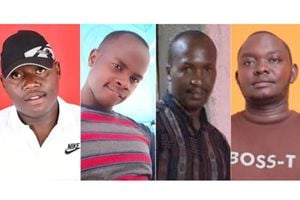South African soldiers cause scene in Zuma's hometown

A South African National Defence Forces soldier.
A group of soldiers from the South African National Defence Forces (SANDF) caused a scene in Pietermaritzburg this week following reports that there could be renewed protests in support of jailed former President Jacob Zuma.
Dropping by rope from a SANDF Oryx helicopter, and landing just across the KwaZulu-Natal (KZN) province premier’s office, the heavy intimidating presence of the special forces in Pietermaritzburg, Durban and other parts of KZN became a spectacle.
After being caught unprepared following violent protests that rocked two provinces in July, the State Security Agency, this time around, activated and alerted the National Joint Operational and Intelligence Structure (NatJOINTS) to potential disturbances.
NatJOINTS is mainly composed of the army and the South African Police Service and sprang into action to avert any possible violent protests like the ones witnessed in July.
July’s rioting was sparked by the jailing of Zuma as his supporters demanded his release.

Jailed former South African president Jacob Zuma.

People protest in South Africa after the imprisonment of former president Jacob Zuma.
Further disturbances were planned for Monday, in what was called the national shutdown.
“Law enforcement agencies are on high alert and have, through the National Joint Operational and Intelligence Structure, put measures in place to ensure the safety and security of South Africans amidst threats of a ‘National Shutdown’ on 23 August 2021,” NatJOINTS said last Sunday.
“The NatJOINTS is aware of inflammatory messages on various social media platforms advocating for violence. Those behind these messages are warned that inciting violence is a criminal offence.
“Members of the public are cautioned against spreading such divisive messages. Equally, a different set of messages is also doing the rounds where people are mobilising to respond to the supposed shutdown.”
The success in intercepting renewed unrest could be credited to President Cyril Ramaphosa’s scrapping of the ministry of state security and moving intelligence operations to his office when he reshuffled the cabinet in early August.
With the State Security Agency now reporting directly to the president, the reaction was swift to summon NatJOINTS to duty in strategic areas in Gauteng and KZN.
While the law enforcement agencies are justifying the deployment of soldiers as necessary to prevent anarchy and prevent the economy from further damage, Economic Freedom Fighters party leader Julius Malema thinks otherwise.
The firebrand politician wants soldiers removed from the streets.
“We don’t need more soldiers on the ground in South Africa. I think we need a political solution to political problems,” he said.
“The problem we are confronted with in South Africa is not insurrection, it is not a coup, not crimes against the state. It is political differences and discontent by the masses of our people on the ground who are desperately seeking the attention of their leadership and intervention especially in poverty-stricken areas.
“These soldiers are deployed to intimidate us, to make us not express ourselves freely. How can you express yourself freely when there's a man here with boots and a long rifle and he's not saying anything? That alone is enough to intimidate people.”
Amid the strong presence of soldiers on the streets, police had already refused to clear the national shutdown march.
The South African Human Rights Commission weighed in, applauding the failure of the protest and saying it already “raised concerns for a repeat of the carnage we experienced during July 2021”.
One of the organisers of the national shutdown, Mandlenyoka Ntuli, said that in denying them the go-ahead to protest, police had claimed the application for a permit was submitted late.
Mr Ntuli argued that they did not want to cause violence and make the country ungovernable.
“We had a problem regarding the time and deadline. The municipality gives you 21 days to process your application for the march,” Mr Ntuli told the Sowetan newspaper.
“Even though we are marching against the government, we don't intend to go against the regulations they have put in place or do criminal acts. We did state that the march is going to be a peaceful one.
"The reports made it sound as if there would be looting or burning of property while that is not the case. We did not have those plans. That is why we decided to go back to the drawing board because we want our march to be peaceful. For now, I can only confirm that we have postponed till further notice.”
It now looks like the renewed threat of unrest might see the security forces on the ground for a longer period.





